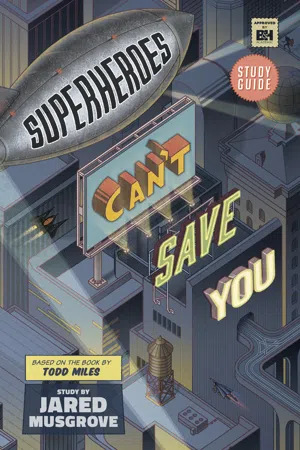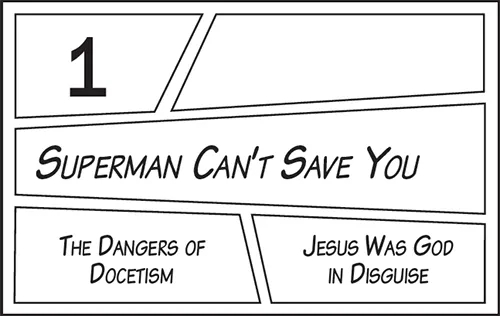
- 56 pages
- English
- ePUB (mobile friendly)
- Available on iOS & Android
eBook - ePub
Superheroes Can't Save You: Study Guide
About this book
"Are you worshiping a fictional superhero, or the Jesus of the Bible?" Have you ever wondered what makes Jesus different from your favorite superhero? Have you questioned how Jesus could really be all that the Bible says he is? This seven-week study, used in conjunction with Todd Miles' Superheroes Can't Save You, will challenge you to keep asking these questions, and point you to answers that are grounded in the Bible's unchanging truth. Bible Study Sessions:
- Session 1: Superman Can't Save You – Was Jesus God in disguise?
- Session 2: Batman Can't Save You – Was Jesus just a remarkable human?
- Session 3: Ant-Man Can't Save You – Was Jesus one of three "costumes" of the one God?
- Session 4: Thor Can't Save You – Was Jesus created by God?
- Session 5: Green Lantern Can't Save You – Was Jesus a good man that God adopted?
- Session 6: The Hulk Can't Save You – Was Jesus a divine mind in a human body?
- Session 7: Spider-Man Can't Save You – Was Jesus part man and part God?
Features:
- No additional leader guide required! This guide contains all of the participant information, plus instructions and suggestions for the week's discussion leader.
- Each week begins with independent work in "The Prologue, " brings the group together for discussion as part of "The League, " and concludes with a time of personal reflection and application in "The Fortress of Solitude."
- Invites you to dive in to an in-depth yet accessible study of Christology – the study of the person, nature, and role of Jesus Christ.
- Great for youth and college groups and adults of all ages who want to learn about Jesus as the Bible reveals him.
Tools to learn more effectively

Saving Books

Keyword Search

Annotating Text

Listen to it instead
Information

The Prologue (complete as a solo adventure prior to your League meeting)
Read the Introduction and Chapter 1 of Superheroes Can’t Save You; 1 John 1; 1 Corinthians 15:35–49; and Matthew 8:21–27.
1. What defines a hero to you?
2. Name heroes in your own life whom you aspire to be like. They can be from the Bible, from history, your family, or even from a work of fiction.
3. Why did you choose these heroes? Is there a character trait that stands out or that they all have in common? If so, name and describe.
4. Write 1 John 1:3 below.
The League (an adventure together with your small group)
To start off the meeting: Welcome each member of the League and have a time of prayer. Spend a few minutes sharing any meaningful quotes from the assigned readings as well as the insights gained as you completed the Prologue.
5. What is your first memory of Superman? Is he a superhero you like? Why or why not? Has that impression changed over time?
6. On page 12, Miles introduces the idea that many Christians throughout history have “Clark Kent-ed” Jesus. They think Jesus only seemed human but was really only fully God all along, much like Clark Kent was never human but only fully Kryptonian. But the Bible tells us that Jesus was fully human as well as fully God. Both are true of him. Describe a time when you “Clark Kent-ed” Jesus. How have you heard others do so?
7. “The early church was quick to recognize the deity of Jesus. But it was not long before the question arose, how can Jesus be both human and divine at the same time?” (p. 13). Do you struggle with this aspect of Jesus’s identity? Explain how.
8. Describe Docetism in your own words. What is its relation to Gnosticism?
9. “Gnosticism’s core tenet was that secret knowledge was necessary for salvation, and that God, who was good and spiritual, could have no direct interaction with the material world. The goal of humanity was to escape the confines of the material world, both now . . . and in the life to come” (p. 15). How have you witnessed this heresy? Share examples from your own life or your family, school, or culture.
10. Miles says this kind of dualism—the teaching that the material world is inherently evil and the spiritual world inherently good—is completely at odds with biblical Christianity (see p. 15). How does a biblical view of Christ differ from the ideas of Docetism or Gnosticism?
11. How should knowing that Jesus was fully human shape the way we relate to him and seek him?
12. Consider how Miles himself fell into the Superman heresy (pp. 17–18) in his sharing of the WWJD movement. What gets in your way of seeing Jesus as your legitimate true example for living a life pleasing to God?
13. Have a League member read 2 Samuel 7:12–13 aloud.
When your time comes and you rest with your fathers, I will raise up after you your descendant, who will come from your body, and I will establish his kingdom. He is the one who will build a house for my name, and I will establish the throne of his kingdom forever.
This is called the Davidic Covenant, and it is one of the most important events recorded in the Bible. What is the Davidic covenant saying (see p. 19)? How does this covenant relate to the reign and rule of Jesus?
14. Read Matthew 8:21–27 and John 4:1–44 aloud, perhaps selecting several readers and breaking up the passage by paragraphs. What goes through your mind when you read of Jesus being hungry, thirsty, or tired? What else do you observe about Jesus from these accounts?
15. Why will the gospel not work if Jesus is not fully human?
16. What other Scriptures from the first chapter stood out to you and why? If applicable, which ones do you want to know more about?
The Fortress of Solitude
17. Read 1 John 1 and re-read pages 24–27 of Superheroes Can’t Save You (the “Why Is This Important?” section). What is your response to what is written in these pages? What is your response ...
Table of contents
- Introduction
- CHAPTER 1: Superman Can’t Save You: The Dangers of Docetism
- CHAPTER 2: Batman Can’t Save You: The Liability of Liberalism
- CHAPTER 3: Ant-Man Can’t Save You: The Menace of Modalism
- CHAPTER 4: Thor Can’t Save You: The Risks of Arianism
- CHAPTER 5: Green Lantern Can’t Save You: The Agonies of Adoptionism
- CHAPTER 6: The Hulk Can’t Save You: The Perils of Apollinarianism
- CHAPTER 7: Spider-Man Can’t Save You: The Tyranny of Eutychianism
Frequently asked questions
Yes, you can cancel anytime from the Subscription tab in your account settings on the Perlego website. Your subscription will stay active until the end of your current billing period. Learn how to cancel your subscription
No, books cannot be downloaded as external files, such as PDFs, for use outside of Perlego. However, you can download books within the Perlego app for offline reading on mobile or tablet. Learn how to download books offline
Perlego offers two plans: Essential and Complete
- Essential is ideal for learners and professionals who enjoy exploring a wide range of subjects. Access the Essential Library with 800,000+ trusted titles and best-sellers across business, personal growth, and the humanities. Includes unlimited reading time and Standard Read Aloud voice.
- Complete: Perfect for advanced learners and researchers needing full, unrestricted access. Unlock 1.4M+ books across hundreds of subjects, including academic and specialized titles. The Complete Plan also includes advanced features like Premium Read Aloud and Research Assistant.
We are an online textbook subscription service, where you can get access to an entire online library for less than the price of a single book per month. With over 1 million books across 990+ topics, we’ve got you covered! Learn about our mission
Look out for the read-aloud symbol on your next book to see if you can listen to it. The read-aloud tool reads text aloud for you, highlighting the text as it is being read. You can pause it, speed it up and slow it down. Learn more about Read Aloud
Yes! You can use the Perlego app on both iOS and Android devices to read anytime, anywhere — even offline. Perfect for commutes or when you’re on the go.
Please note we cannot support devices running on iOS 13 and Android 7 or earlier. Learn more about using the app
Please note we cannot support devices running on iOS 13 and Android 7 or earlier. Learn more about using the app
Yes, you can access Superheroes Can't Save You: Study Guide by Jared Musgrove in PDF and/or ePUB format, as well as other popular books in Theology & Religion & Systematic Theology & Ethics. We have over one million books available in our catalogue for you to explore.